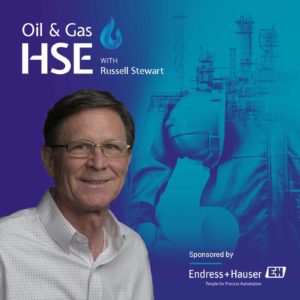In this episode of the Oil and Gas HSE Podcast (brought to you on the Oil and Gas Global Network by Endress+Hauser), host Russell Stewart talks with Arvind about the TOPCORP training program for oil and gas inspectors, and the latest landscape on monitoring methane emissions.

Oil and Gas HSE Podcast
ENSURING YOUR PEOPLE GO HOME SAFE EVERY DAY
Hosted by Russell Stewart
One of our frequent TOP Energy subject-matter experts and course creators is Arvind Ravikumar, Research Associate Professor in the Department of Petroleum & Geosystems Engineering at The University of Texas at Austin. Dr. Ravikumar’s research focuses on technical and policy solutions to reduce greenhouse gas emissions from the global energy sector. His group, the Sustainable Energy Transition Lab, employs an interdisciplinary approach that integrates field work, modeling, and policy analysis to answer critical questions around our energy future. Specific topics include the role of new technologies in decarbonizing the oil and gas industry, methane emissions and the future of LNG and natural gas, equitable energy transitions in extractive economies, and energy demand and sustainability in the developing world. The current geographic focus is on North America with a growing interest in its linkages to global energy trade. The research group welcomes people from a variety of backgrounds including atmospheric scientists, engineers, economists, and public policy experts to push the frontiers of energy and climate policy research. In addition to Arvind’s position at UT, he is also a non-resident fellow with the Payne Institute for Public Policy at the Colorado School of Mines.
In this episode, Dr. Ravikumar and host Russell Stewart discuss the EPA’s proposal to update, strengthen and expand its November 2021 proposal to reduce emissions of methane and other harmful air pollution from both new and existing oil and gas operations. The Agency has issued a supplemental proposal that would achieve more comprehensive emissions reductions from oil and natural gas facilities by improving standards in the 2021 proposal and adding proposed requirements for sources not previously covered.
*Equation Sheets referred to by Russell Stewart during the podcast can be found on the website for the Center for Subsurface Energy and the Environment at The University of Texas at Austin.
About Dr. Ravikumar: After completing his BE (Electrical Engineering) and MSc (Physics) from Birla Institute of Technology and Science, Dr. Ravikumar went on to complete his Ph.D. and M.A. in Electrical Engineering at Princeton University (2015). After a postdoctoral fellow at Stanford University, he started a faulty position at Harrisburg University of Science & Technology in 2018. In 2021 Arvind began his current position at The University of Texas at Austin where he conducts research with his Sustainable Energy Transition Lab and teaches courses related to sustainability and the energy transition.
Watch This “Methane Emissions and Fines Under the Recently Passed Inflation Reduction Act” Presentation by Mohamed Rali Badissy
Ready to improve your oil & gas knowledge?
You can save 10% off your first Course purchase with promo code PODCAST at checkout
About TOP Energy Training
TOP Energy Training is the authority for oil and gas training, trusted by industry regulators, educators, and employers. We are an educational consortium that is composed of Colorado School of Mines, Penn State University, and The University of Texas at Austin. Together, we design and create online courses for oil and gas professionals, focusing on the fundamental technology, science, and engineering of oil & gas operations.
Since 2012, we have delivered more than 42,000 hours of content to professionals as part of our flagship program for field inspectors and regulatory personnel. Now we make these high-quality online courses available to professionals, educators, & students who would like a better understanding of the ever-changing technology in the industry.
We’ve brought together instructors, subject matter experts, and industry professionals to create online courses that include professional video and interactive multimedia to visualize complex oil and gas principles and equipment. We’re thrilled to be able to share the knowledge of our subject-matter experts with students, industry professionals, and companies who are looking for ways to expand their comprehension of the oil and gas industry.

